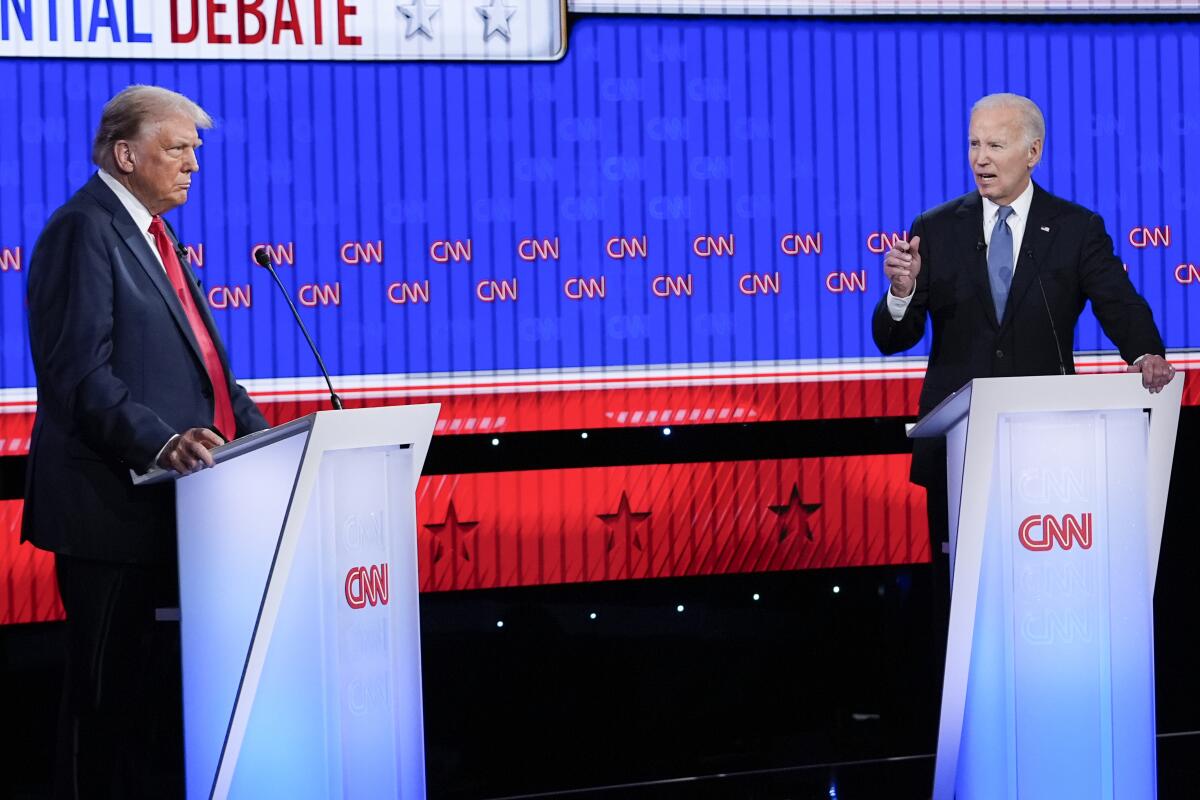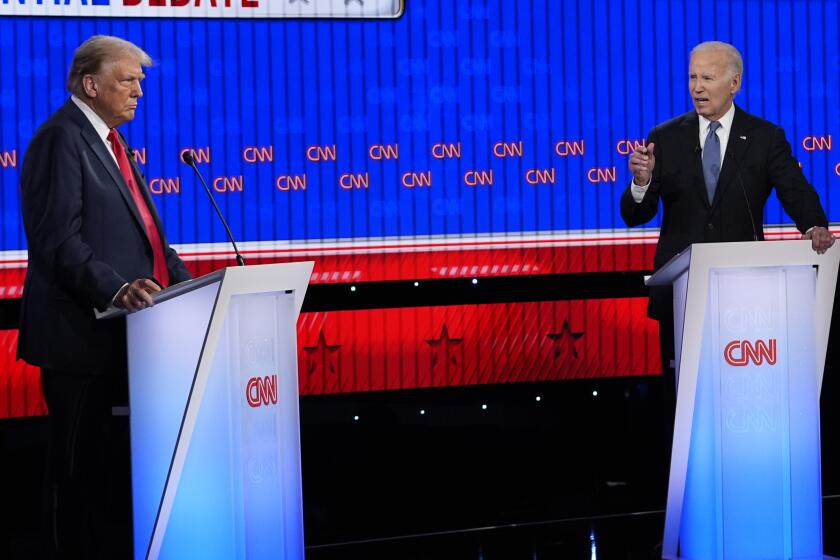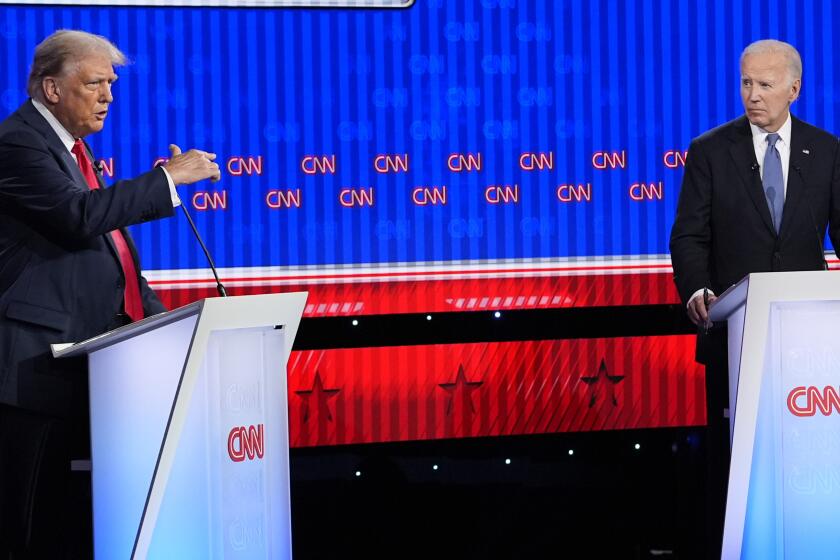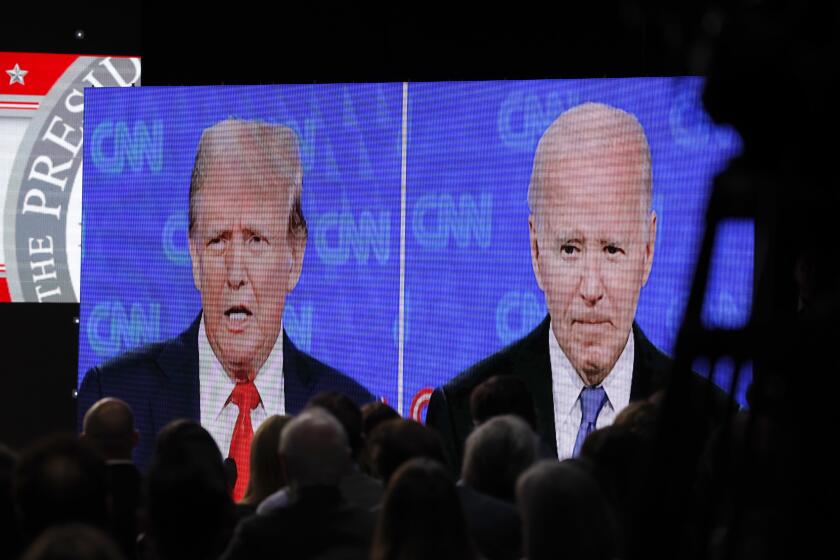Column: Biden’s debate gamble went spectacularly wrong. Now Democrats are in panic mode

WASHINGTON — President Biden’s decision last month to call for a June debate against former President Trump was a gamble — a calculation that the campaign needed to do something to shake up an extraordinarily stable race in which they were stuck in second place.
Thursday night, with a massive television audience watching, that gamble went spectacularly wrong.
You're reading the L.A. Times Politics newsletter
Anita Chabria and David Lauter bring insights into legislation, politics and policy from California and beyond. In your inbox three times per week.
You may occasionally receive promotional content from the Los Angeles Times.
The campaign’s top priority was to quiet the concerns that millions of voters have had about the 81-year-old Biden’s mental acuity.
Instead, Biden inflamed those worries. He stumbled through his answers to the debate’s first few questions, including one roughly 10 minutes in during which he appeared to entirely lose his train of thought.
“Making sure that we’re able to make every single solitary person eligible for what I’ve been able to do with the, with the COVID,” he said. “Excuse me, dealing with everything we have to do with … Look … if …” He paused, then, inexplicably ended with, “We finally beat Medicare.”
Prominent Democrats in panic
His performance improved somewhat as the debate proceeded, but he never seemed in command and frequently showed his age. His voice sounded thin and raspy — he told reporters afterward that he had a sore throat — and during Trump’s answers, the camera often caught him looking on with his mouth agape. At the end, his two-minute prepared closing statement wandered.
Biden’s struggles deflected attention from Trump’s repeated falsehoods during the debate. By the time the two candidates walked off the CNN stage in Atlanta, prominent Democrats did not try to hide their dismay.
“It was a really disappointing debate performance from Joe Biden,” the president’s former communications director, Kate Bedingfield, said on CNN shortly after the debate ended.
In her CNN interview, Vice President Kamala Harris sought a more positive spin, but only slightly: “Yes, there was a slow start, that’s obvious to everyone,” she said, but then credited Biden with “a strong finish.”
Off-camera, elected Democrats were in full panic, discussing whether someone could persuade the president to step aside and allow the party to nominate some other candidate.
“There’s panic in the Democratic Party. It’s going to be a long night,” Maria Shriver, the former first lady of California and niece of President Kennedy, wrote on the social media platform X.
To be clear, no Democratic Party official or combination of officials has the authority to force Biden out. He won the party’s primaries. The nomination is his to claim; he can renounce it, but only if he so chooses.
But the fact that the question is once again at the top of Democrats’ agendas is a measure of how deeply Biden’s poor showing rattled party activists.
Trump pays little price for falsehoods
In the presidential debate, each candidate hoped to pass a test for voters. Both failed — but Biden’s stumbles will probably cost him more than Trump’s.
Trump, who had the advantage of entering the debate ahead in polls, had his own task — avoiding the out-of-control aggression that turned off voters during his first debate with Biden in 2020.
He largely achieved that, although his answers were riddled with false claims and sometimes dove into the thickets of conspiracy theories that can be incomprehensible to anyone not thoroughly steeped in right-wing media.
Mostly, however, he stuck to a clear plan: Regardless of what topic he was asked about, he responded with one of two attacks — that the president is “weak” and that the country is under threat from immigrants crossing the border illegally.
“We are living right now in a rat’s nest,” he declared at one point. “We don’t have borders anymore. People are coming in, and they’re killing our citizens at a level that we’ve never seen.”
Those assertions are false. The homicide rate is at one of its lowest points in decades, and immigrants, overall, are less prone to commit crimes than native-born U.S. citizens.
But Trump paid little price: Biden accused him several times of telling lies, but did not try to offer specific rebuttals, and the CNN moderators said from the outset that they were not going to fact-check the candidates during the debate.
Trump may be vulnerable on some of the policies he has proposed on immigration, especially mass deportations of people in the country without legal documents. But Biden largely failed to stress that.
Trump is more vulnerable on other issues, such as abortion, on which his party has struggled. But he was able to minimize the time spent on that topic, in part because Biden did not press him on the subject and even changed course during one of his own answers on abortion to return the discussion to immigration.
Trump deflected questions about what abortion policies he might pursue on the federal level, sticking to his line that the issue is now one for states to handle.
Each side has weak supporters
Relentless attacks on Biden fit Trump’s personality and now familiar political style. But they also may serve him well in the particular dynamics of this campaign.
Biden and Trump exchanged insults at Thursday’s debate, at times getting personal.
Both candidates have significant groups of supporters who could be at particular risk for defecting — or for staying home on election day.
In Biden’s case, a key group are those who say they plan to vote for him even though they somewhat disapprove of his job performance.
As one would expect, polls have shown Biden overwhelmingly winning among voters who approve of how he’s doing his job and overwhelmingly losing among people who strongly disapprove.
But among people who say they only somewhat disapprove of his job performance, he’s been running about even. As polling analyst Dan Guild recently wrote, that’s a remarkable achievement considering that both Trump and President Obama lost such voters by enormous margins in their reelection bids.
About one in eight respondents fit into the somewhat-disapprove group in recent polls. The share is significantly higher among people who are younger than 30.
Support from the somewhat-disapprove group has been key to keeping Biden competitive. For Trump, deepening those voters’ existing doubts about Biden would be one clear path toward expanding his lead.
Trump’s key vulnerability could be the support he currently draws from Black and Latino voters, especially younger ones. Polls consistently show him getting much more support from those groups than he did in either 2016 or 2020.
Those voters are an uneasy fit with Trump’s core supporters, who are older, white, conservative and in many cases deeply suspicious of immigrants and hostile to Black Americans.
Keeping his core supporters fired up while not losing the support of Black and Latino voters poses a potentially tricky balancing act for Trump.
Biden, however, did little to exploit that potential weakness.
A lost opportunity
It’s easy to exaggerate the impact that debates have on a presidential race: Party activists and journalists pay far more attention to the televised encounters than swing voters do.
Twelve years ago, Democrats panicked over Obama’s poor performance in his first debate against the Republican nominee, Mitt Romney.
In their first televised debate, Biden and Trump called each other criminals and liars.
In the end, that debate had almost no lasting impact.
In this case, voters had low expectations of Biden going in. A poll by Ipsos for the FiveThirtyEight website showed that likely voters expected a performance that was below average. Matching those low expectations may not change many minds.
Biden’s problems, however, went beyond questions of performance or delivery. Throughout the 90-minute encounter, he never provided a compelling argument for his reelection or a coherent account of what a second term would be about.
And, of course, he did nothing to fix the problem that the June debate was designed to address: He’s behind, especially in the race that truly counts, the state-by-state effort to amass the 270 electoral votes needed for victory.
Trump’s lead has never been large, and it has slipped slightly since his criminal conviction last month in New York. On average, polls taken in the weeks since the jury verdict have shown the race roughly tied nationally.
But the six or seven states that make up the battleground for this election — Arizona and Nevada in the Southwest, Georgia and perhaps North Carolina in the Southeast and Pennsylvania, Michigan and Wisconsin in the industrial North — are each somewhat more conservative than the country as a whole. Because of that, a tied race nationally translates into advantages for Trump across the swing states.
Biden — assuming he stays in the race — needs to change the trajectory of the campaign. The debate was one of his best opportunities to try to make that happen. Having squandered it, he may not get another chance.
What else to read
Poll of the week: Beyond the debate headlines, here’s what Americans think about the role of government.
The L.A. Times special: Good news for 100% clean energy. Geothermal has finally arrived in California.
A Saturday must-read: Britain’s Conservatives are about to lose big.
How did their fall from power happen?
—
Was this newsletter forwarded to you? Sign up here to get it in your inbox.
Get the L.A. Times Politics newsletter
Deeply reported insights into legislation, politics and policy from Sacramento, Washington and beyond. In your inbox three times per week.
You may occasionally receive promotional content from the Los Angeles Times.







